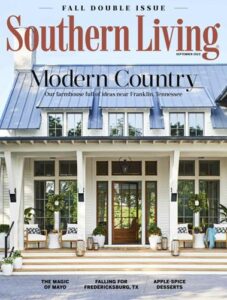Franklin, Tennessee is in the South, and yet, it is no longer “the South”.
This statement may seem contradictory, so allow me to explain as someone who has lived in the area for the past four years.

Photo Courtesy of Southern Living – Idea House 2023
When Southerners say the south, they are not referring to geographic location within the United States. To them, “southern” is indicative of a culture and traditions that have been in place for hundreds of years. “Southern” includes things like hospitality and referring to your elders as ma’am and sir. Southern means saying “bless their heart” and hugging people because you are, somehow, although you can’t quite remember the specifics, distantly related. Southern is a way of living- one that often includes learning the life story of someone you met in the grocery store and never being in too much of a hurry to respond to an email.
When I first moved to Franklin in the fall of 2019, I experienced some major culture shock as I tried to adjust to this new way of interacting with others (little did I know while growing up in the Midwest that simply walking past someone on the street is reason enough to start a conversation). At that time, Franklin was still distinctly “southern”, and I felt like an outsider, like I was an “other” in their community. When I started attending the local high school, these feelings were only amplified. My peers had different values and even dressed differently. Friday night football was a part of their culture, and 60 degrees Fahrenheit was reason enough to break out a coat. Undoubtedly, there were other students who were also transplants at the time, but most of my classmates were born and bred Tennesseans. On the whole, I was the odd one out, the one who had to change to fit in.

“The New Franklin” Image Courtesy of https://visitfranklin.com
Four years and a pandemic later, this is no longer the case. If you were to walk through downtown Franklin today, I am willing to bet you wouldn’t hear a single Southern accent. At the high school, you would find large populations of students who moved from another state. Now, being a newcomer to the area is common, and natives are considered the “others”. Some traditions remain, and the people are still, on average, more likely to allow you to change lanes than speed past, but the distinctly “southern” feel is lessening every day, and with it shifts the perceptions of who belongs and who does not.
It is an interesting thing to consider. Growing up, we all ponder what it means to fit in. We view some as the in crowd while dismissing those we see as a collective “other”. But as I witnessed first-hand in the place I call home, those parameters are always changing. Where one might be seen as a vital community member one day, in one place, they may, the next, be pushed aside as part of a homogeneous group of those who are outsiders. At the end of the day, there is a temporal nature to the idea of “others”.
I believe, because of this fact, it is especially important we move past preconceived notions and instead see individuals and individual groups with all their unique characteristics and values.
This is particularly true as we begin the study of a new region.

Map Courtesy of https://albahaeaphg.wordpress.com/2019/01/10/north-africa-and-middle-east-map-quiz/
As a student in the United States, it is all too easy to group members of a different region together. To view them as “other” because their culture, religion, and values are not the same as our own. In reality, they are as unique as we are. They live in different countries and speak different languages. Being in the same region does not indicate homogeneity or even similarity. Just as two people living in New York are not the same as their peers in Alabama, neither are two people living in Algeria inherently similar to those living in Turkey.
In the Middle East North Africa (MENA) region, we must also consider the role of change. Just as in the small-scale example of my hometown, there are times when certain groups are viewed as belonging and later are viewed as different. Identities shift, and if we wish to pick up on these nuances, we must first recognize individuality. Only then can we begin to have some small understanding of the place we have chosen to study.
September 27, 2023 at 8:18 pm
A major challenge for us analytically is that in social science generalizations and abstractions are essential as we seek patterns. It may be necessary to be comfortable with some degree of cognitive dissonance as we try to hold in our heads both a respect for the individual specificities of different countries, regions, groups, etc., and attention to the commonalities across them.
Do you have thoughts on how to maintain this balance?
September 29, 2023 at 4:48 pm
I think an important part of maintaining balance is limiting the level of generalization or attention to nuance. For example, when studying the Arabian peninsula, one may be looking for general patterns or themes, but one shouldn’t go as far as to say all countries in the area are oil rich just because it is true of most. In such a case, there is an a major outlier (Yemen) and that should not be overlooked. Working in the other direction, one shouldn’t say the countries in the Arabian peninsula are all drastically different due to finite variances when common threads are apparent. In research and in analysis, it can be hard to say definitely but, generally speaking, I think balance can be maintained by staying somewhere in the middle of noticing only specificity and only commonality.